Methodology of the Gender ScanTM 2021 survey
The Gender Scan TM 2021 survey was conducted online (in 117 countries) from March to August 2021, on a declarative basis among 30,001 male and female respondents worldwide (11 years and older). In Belgium, the total number of respondents was 650 students, which results in a margin of error of 3.8%. In Europe, the total number of respondents is 2616 students, which results in a margin of error of 1.8%.
Gender Scan TM is a reference survey for all digital stakeholders, companies and public authorities.
The proportion of female graduates in the digital sector is increasing in Belgium, but it is still only 12% and remains below the European average of 20%.
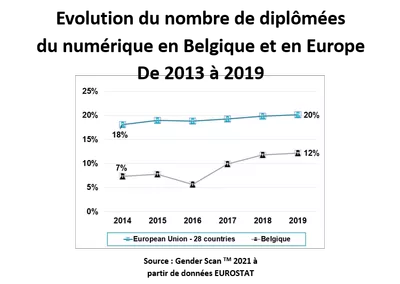
After a sharp drop in 2016, the proportion of female students in digital education in Belgium is on the rise again. They represent 12% of the workforce in 2019 (vs. 6% in 2016), but their proportion remains well below the European average.
The obstacles are greater: six out of ten female students say they have been discouraged from studying in the digital sector, compared to one in two in Europe.
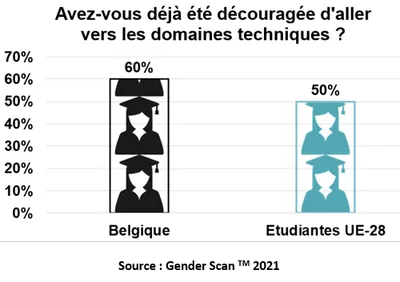
60% of female digital students were discouraged from taking up digital studies (compared to 50% in Europe) mainly by their teachers or parents. The most common reason given for discouraging them from undertaking these studies was that they did not have the required level. The students interviewed explained that: "I was told that it was not for me, I was bad at maths". "It was too intelligent a job for me", said a 23-year-old student, or "It's too hard for you, you won't be able to do it", said another 21-year-old student.
The second argument most heard by these students is that IT is not a field for women: "It's a man's field, it doesn't suit you", said a 22-year-old student, or "It's a man's job, what a notion to choose studies where there are so few women", said a 24-year-old student.
89% of female digital students in Belgium are satisfied with their choice of career path, a lower rate than other female students in other European countries.
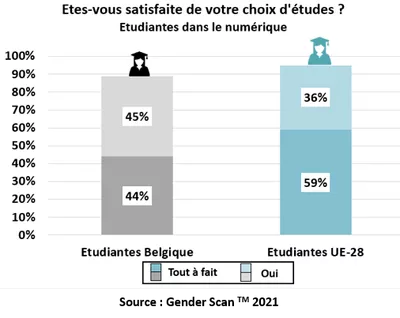
In Belgium, 44% of female digital students are very satisfied with their studies, 15 points lower than in Europe. A more detailed analysis of the reasons for satisfaction and dissatisfaction given by students helps to explain this gap. Fewer female students feel comfortable in Belgium than in Europe: 75% versus 81%.
Fewer also feel integrated: 74% compared to 79% in Europe. In addition, there are differences in the way studies are organised: 50% of students feel that it is satisfactory in Belgium compared to 61% at European level. The discipline is considered interesting by 69% of respondents in Belgium compared to 77% in Europe, and the possibility of finding a job is valued by 82% of students in Belgium compared to 87% in Europe. The third factor explaining this difference is that a much higher proportion of female students in Belgium say they are stressed by studying in the digital sector (82% in Belgium, compared with 67% in Europe), and that they feel they do not have the required level (67% in Belgium compared with 59% in Europe).
As in Europe, in Belgium three out of ten female digital students have been victims of sexist behaviour.
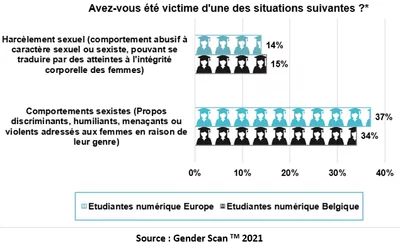
34% of female students say they have experienced sexist behaviour in the course of their studies, and 14% have been victims of sexual harassment. These proportions are similar to those observed in Europe. It should be noted, however, that 84% of female digital students in Belgium say they do not know whether their university has any support mechanisms in place on this subject, whereas this applies to only 63% of respondents at European level.
Yet this is a point on which more than nine out of ten female students in Belgium, as in Europe, would like to see initiatives taken.
The summary of the survey and the verbatims are available upon request.
For Elizabeth Tchoungui, Executive Director of Corporate Social Responsibility for the Orange Group, and Deputy President of the Orange Foundation, partner of Gender Scan worldwide
"Encouraging young girls and women to choose technical and digital professions is a priority for Orange. Being able to inspire women to invest in the tech ecosystem is for the Orange Group the necessary condition for innovation shared by all."
Definitions
Digital students and graduates
Students and graduates of higher education (ISCED levels 5 to 8: post-baccalaureate short courses, bachelor's, master's and doctoral levels) in digital specialisations (courses falling under ISCED 2013 category 6, which includes, in particular, programming, network creation and administration, software and application development).
About the author, Claudine Schmuck and Global Contact
Claudine Schmuck is the founder of Global Contact, a reference and research firm on the employment and training of women and young people in the scientific, technical, high-tech and innovation fields. She is also the author of "Women in STEM disciplines", published by Springer in 2017. A graduate of the Institut d'Etudes Politiques (Paris) and Columbia University (New York), Claudine Schmuck was previously a member of ministerial cabinets (Foreign Trade, Industry), a media and new technologies specialist at McKinsey, then at CLT and Bull. She is an expert at DG Research, DG Connect and DG Enterprise (European Commission). She is a member of the board of Women in Leadership, a member of Vox Femina and President of the Sciences Po Alumni Digital Group.
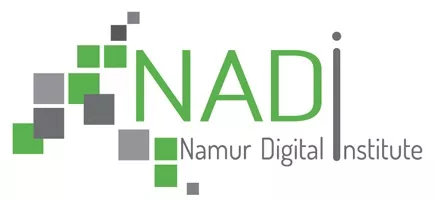
About the University of Namur and the NaDI research institute
UNamur's mission is teaching, research and service to the community. It offers a quality education that places great importance on reflection on the meaning of Man and on the values that make up the society in which he lives.
This education is nourished by cutting-edge research that combines excellence and concern for the long term. It pays particular attention to interdisciplinarity and takes into consideration the human and social issues of science and technology. Each year, the University of Namur welcomes more than 7200 students of nearly 70 different nationalities. Among the 11 research institutes that make up the University, the NADI research institute brings together researchers in computer science, digital law, digital marketing, innovation and digital education, including Julie Henry, who is responsible for setting up the survey at UNamur.
